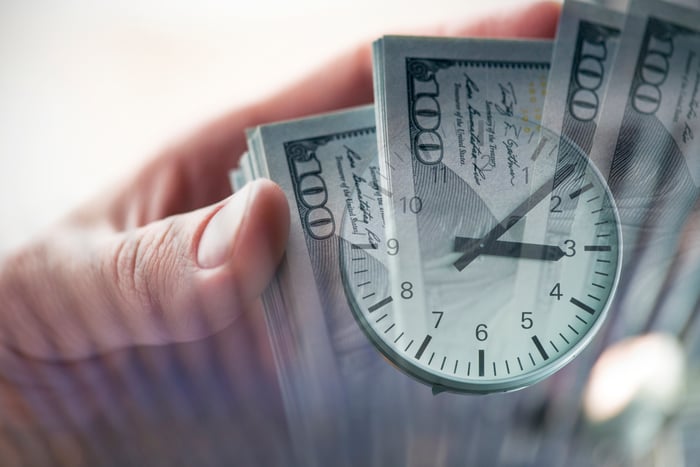Berkshire Hathaway (BRK.A -0.34%) (BRK.B -0.01%) CEO Warren Buffett is arguably in a class of his own when it comes to generating wealth on Wall Street. Since taking over as CEO in 1965, he's created more than $710 billion in shareholder value for Berkshire Hathaway's shareholders (himself included), and led the company's Class A shares to an aggregate gain of more than 3,800,000%!
While there's no shortage of reasons the Oracle of Omaha, as Buffett has come to be known, has been so successful, his attraction to dividend stocks has certainly played a key role.

Berkshire Hathaway CEO Warren Buffett. Image source: The Motley Fool.
Dividend stocks have a knack for outperforming
Nine years ago, J.P. Morgan Asset Management, a division of JPMorgan Chase, released a report that compared the annualized performance of stocks that initiated and grew their payouts over a 40-year period (1972-2012) to publicly traded companies that didn't pay a dividend. The result was night and day, with dividend stocks averaging an annual gain of 9.5% and the non-dividend payers crawling to a meager annualized gain of 1.6% over the same 40-year stretch.
These results shouldn't be all that surprising. Companies that regularly pay a dividend are usually profitable on a recurring basis, time tested, and have transparent long-term outlooks. This is generally a recipe for publicly traded companies to increase in value over time.
The biggest challenge for income seekers is maximizing the yield they receive while minimizing risk. Unfortunately, previous studies have shown that once dividend stocks reach high-yield status (a yield of 4% or above), yield and risk tend to correlate. Since yield is a function of payout relative to share price, a struggling or failing operating model with a falling share price can lure investors into what's known as an income trap.
Although not all high-yield or ultra-high-yield stocks are bad news, they often require a lot of extra vetting by investors.

Image source: Getty Images.
Here's how Buffett is scoring a 54% yield on his fourth-largest holding
However, Warren Buffett has found a way to generate jaw-dropping yields from some of his top portfolio holdings without much risk involved at all. His secret? Allowing time to be his ally.
Berkshire Hathaway's portfolio contains 46 securities, some of which Buffett has been holding for a long time. The longest-tenured of these positions is beverage giant Coca-Cola (KO 0.15%), which has been a continuous holding since 1988. Today, Coke is Berkshire's fourth-largest holding by market value (about $25.1 billion).
Every year, when Berkshire Hathaway releases its annual shareholder letter from Warren Buffett, it publishes its cost basis for the company's (roughly) 15 largest positions. Coca-Cola's cost basis is $1.299 billion, which equates to a per-share cost of $3.2475, given that Berkshire Hathaway owns 400 million shares.
The thing is, Coca-Cola has increased its base annual payout for 60 consecutive years, including the most recent payout hike, which was announced on Feb. 17. Based on the company's new annual payout of $1.76, Warren Buffett is netting a 54.2% yield on Coke, relative to Berkshire Hathaway's $3.2475 cost basis. In other words, the dividend alone is enough for Buffett to more than double his initial investment in Coca-Cola every two years.
While a 54% yield on cost is more than enough to keep the Oracle of Omaha a content Coca-Cola shareholder, there are other reasons he's stuck with the position. For instance, Coke offers virtually unparalleled geographic diversity among consumer goods stocks. Its products can be found in all but two countries worldwide (North Korea and Cuba), with the company sporting around 20 brands in its product portfolio that are generating at least $1 billion in annual sales.

Image source: Getty Images.
Warren Buffett is netting 20% (or higher) yields from other key stocks, too
Being patient and allowing his investment thesis to play out over an extended period of time has worked wonders for Buffett -- and not just with Coca-Cola. Though Coke's 54% yield on cost is the most eye-popping result, Berkshire enjoys at least a 20% yield on cost from two other core holdings.
For instance, credit-services provider American Express (AXP 2.56%) is a company Berkshire Hathaway has held since 1993. Even though AmEx's current yield of 0.89% is nothing to write home about, Berkshire's cost basis on the stock is only $8.49. Based on the company's $1.72 annual payout, Buffett's nearly three decades of patience has resulted in a yield of 20.3%, relative to Berkshire's cost basis.
American Express' knack for attracting affluent clientele has always been its not-so-subtle secret to success. The well-to-do are less inclined to change their spending habits when minor hiccups to the U.S. and global economy present themselves. This has allowed AmEx to grow with the U.S. and global economy over time, as well as lift its payout to shareholders.
There's also credit-ratings agency Moody's (MCO 0.77%), which Buffett has been holding for more than two decades. With a base annual payout of $2.80 (this works out to only a 0.86% current yield) and a cost basis to Berkshire Hathaway of $10.05, Buffett is netting a cool 27.9% yield on cost.
Moody's business may not be flashy, but demand for rating bonds has shot higher over the past decade as borrowing costs plummeted. Add in an even faster-growing analytics segment, and you can see why Buffett has had no intention of selling Berkshire's remaining stake in the company.
If you hold high-quality dividend stocks long enough, you may see them grow into double-digit-yielding companies, relative to your cost basis, just like Warren Buffett has.





